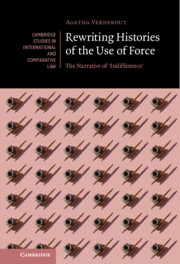Book contents
- Rewriting Histories of the Use of Force
- Cambridge Studies in International and Comparative Law: 160
- Rewriting Histories of the Use of Force
- Copyright page
- Contents
- Foreword
- Acknowledgements
- Abbreviations
- Introduction
- Part I The Use of Force in Nineteenth-Century Doctrine
- Part II The Use of Force in Nineteenth-Century Practice
- Part III The Narrative of Indifference in the Twentieth Century
- 8 Disciplinary Beliefs about International Law and the Narrative of Indifference
- 9 The Emergence of the Narrative of Indifference in the Interwar
- Conclusion of Part III
- Conclusion
- Bibliography
- Index
- Cambridge Studies in International and Comparative Law
8 - Disciplinary Beliefs about International Law and the Narrative of Indifference
A Mirror Effect
from Part III - The Narrative of Indifference in the Twentieth Century
Published online by Cambridge University Press: 10 September 2021
- Rewriting Histories of the Use of Force
- Cambridge Studies in International and Comparative Law: 160
- Rewriting Histories of the Use of Force
- Copyright page
- Contents
- Foreword
- Acknowledgements
- Abbreviations
- Introduction
- Part I The Use of Force in Nineteenth-Century Doctrine
- Part II The Use of Force in Nineteenth-Century Practice
- Part III The Narrative of Indifference in the Twentieth Century
- 8 Disciplinary Beliefs about International Law and the Narrative of Indifference
- 9 The Emergence of the Narrative of Indifference in the Interwar
- Conclusion of Part III
- Conclusion
- Bibliography
- Index
- Cambridge Studies in International and Comparative Law
Summary
Having further evidenced the discrepancy between the modernhistorical narratives on the prohibition of the use of force and historical sources, this chapter is the first of two which attempts to understand the origins and persistence of the narrative of indifference. Using Lévi-Strauss’s work on myths illustrates how this narrative can be considered to find its source in the identity of international law as a discipline. It starts by trying to evidence the ‘core beliefs’ that can be considered to underlie this identity. It argues that central to international law is the belief that law is the sine qua non condition of order and peace. Identifying different iterations of the narrativeofindifference and using tools of linguistic analysis, it shows how this belief structures the narrative of indifference from both a syntagmatic and paradigmatic point of view.
Keywords
- Type
- Chapter
- Information
- Rewriting Histories of the Use of ForceThe Narrative of ‘Indifference', pp. 219 - 269Publisher: Cambridge University PressPrint publication year: 2021

